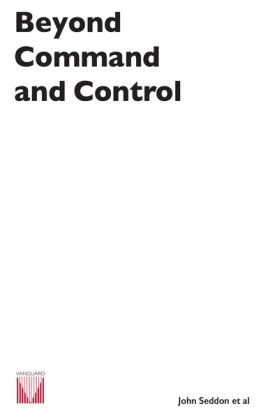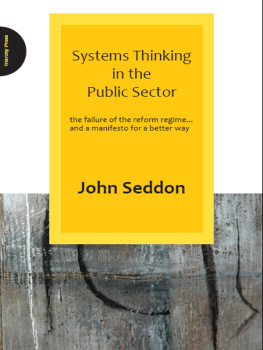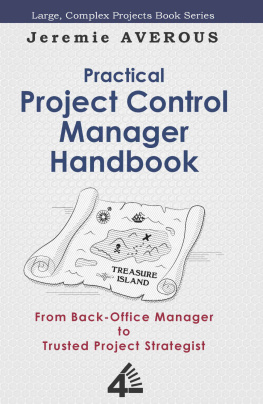
Reviews
The leading part of an advancing military formation is known as a vanguard. One of its functions is to seek out the enemy and secure ground in advance of the main force. This is what John Seddon and his colleagues from Vanguard have done, once again. Vanguard is at war with traditional management, and they are right there at the frontline, fighting outdated beliefs about management and leadership.
In Beyond Command and Control, the thinking behind traditional management and the resulting practices are both ruthlessly challenged: budgets, targets, individual incentives, economy of scale and many others illusions of control and efficiency. Even Agile is challenged. Not the original intention behind it, but the industry it has developed into. This is all done with a sharp tongue, and with deep insights from years of hands-on studies of the real situation on the ground in a range of dysfunctional organisations.
One day the main force will be able to move in, thanks to brave vanguards who dared to challenge accepted truths.
Bjarte Bogsnes, Chairman, Beyond Budgeting Institute
Aviva PLC sees the change method described in these pages as a strategic signature a way of improving how our organisation works through changing how all our leaders think. The Vanguard Method is fundamentally changing, for the better, what we can do for our customers and the culture within our business. This book provides insights and case studies of the impact Johns approach brings to organisations looking to break out of conventional thinking.
Darren Cornish, Aviva PLC Group Director, Systems Thinking
An essential read for all leaders - it will no doubt rock your long held beliefs of what we do as leaders - and it will allow you to discover how you truly can add value to your organisation and the populations you serve.
Having worked with Vanguard and the systems thinking methodology for a number of years, I am able to appreciate what going on this journey means for individuals. A few months into my journey, I was faced with a sudden realisation that my beliefs as a leader has been completely shattered. Not an easy experience to say the least - my foundations as a leader, that had been the bedrock of my practice for so long, seemed completely redundant and irrelevant. I also was a bit dumbfounded to say the least how on earth I had been able to fool myself for so long.
There is such a temptation, in most organisations, and the public sector is no exception, when faced with difficult situations or challenges, to increase grip and control, to increase scrutiny and challenge meetings, to ensure important decisions are made at the most senior level possible. In reality what we need to do as leaders it to study the work - to study the demand for our services - and by doing so, we create a whole new meaning for the word management.
If you are curious as to how you can lead differently - look no further than this book. If you are trying to transform services within your organisation, but see no real change in performance - look no further than this book. If you are asking yourself, why your change programmes have not delivered the change you envisaged or planned - then look no further than this book.
My overwhelming wish as a leader is that more and more of us make the change as leaders - I cannot ever go back to managing and leading as I used to - but wouldnt it be great if the new way was the norm!
Awen Morwena Edwards, Corporate Director and Statutory Director of Social Services, Gwynedd Council
Demand is rising in Health and Social Care. We measure it all the time. It is our biggest concern; how will we cope? How will we manage the pressure on staff to prevent them leaving when totally disillusioned and burnt-out by the pace of work and the impossibility of doing a good job when it matters most? John and the Vanguard Method give us hope, and more than hope they give us a method.
Some leaders have paused and decided to stop doing the wrong thing righter. Leaders who have been fortunate enough to work with John and his team have studied their own systems. They have learnt about the demand for their services, what constitutes value work, and how well the current system achieves its purpose, as defined by the citizen. These leaders have developed an understanding of what matters to the people who need or chose to use their services, and they have learnt how the current system achieves or fails to meet citizens needs. This gives a very different platform for redesigning services.
Eliminating demand caused by failure in our health and care systems could provide a huge opportunity for us to improve peoples experiences of care, and for people to achieve the outcomes that they value. Staff could have oodles more satisfaction at work, and by getting it right first time, by eliminating non value adding work, we could release resources to do better things. What are we waiting for?
Iolanthe Fowler, Clinical Director Integrated Community Care and Primary Care Interface Services, Sheffield Teaching Hospitals Foundation Trust
Ive known John and his work for many years. The results his approach delivers are well known and widely lauded. As he writes change is a normative process. Thats to say, folks have to go see for themselves how things really are, and experience the dysfunctions of the status quo before becoming open to the possibilities of pursuing new ways of doing things. This resonates with my work in the Marshall Model, with command-and-control being a universal characteristic of Analytic-minded organisations and systems thinking being reserved to the Synergistic- and Chaordic-minded.
One stand-out section of the book is the chapters explaining the role of software and IT systems. John echoes a now-common view in the software community regarding Agile software development and the wider application of Agile principles: we soon came to regard this phenomenon [Agile] as possibly the most dysfunctional management fad we have ever come cross. These chapters give an insight into the progressive business perspective on the use of software and IT in business, in Johns words putting IT last. In mine: #NoSoftware.
Bob Marshall, Organisational Psychotherapist, Digital Transformation specialist and flow-chain sensei
This book is an excellent guide for leaders using the Vanguard Method, it gets into the how and why of the Vanguard Method in practice. Explanations of how the method works are clear and the comparisons with conventional management thinking are detailed and illustrative of the challenges in bringing new thinking into an organisation.
I especially like the careful analysis of Agile. It highlights the perils in mistaking a technique for a method and how techniques can take on a life of their own in the hands of consultants seeking to earn a living.
My favourite quote from the book: If you are doing the wrong thing without knowing it, you wont be able to get to the right thing by studying why the wrong thing went wrong. This book will point you to the right thing.
Stephen Thorpe, Director, City Operations, Wyndham City, Australia
This book teaches you how to create change that delights customers and employees alike. Customers feel well served and employees are allowed to use their brains without the corrupting influence of measures and standards. Understanding and fixing the system from the customers perspective replaces the well-intentioned but misplaced manipulation of employees to do more of the wrong thing. Beware, this book will transform your organizational culture.
Walter Weber, President and CEO of UTEX Scientific, Ontario Canada
Command and control has failed. For decades it has been taken for granted that this is the only way to get things done. It has been especially beloved by would-be-heroic leaders, on-the-make politicians, and back-watching bureaucrats. With its apparatus of standardisation, target-setting, budget management, coercion, inspection, and more recently digitisation, it promised efficiency, growth, and prosperity. Instead, it has produced a national productivity crisis, rising costs, failure demand, and services we should be ashamed of.
Next page









